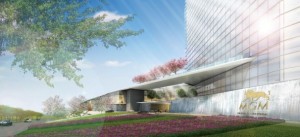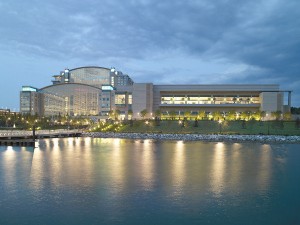If a July opening of MGM National Harbor, in Maryland, sounded too good to be true, it was. The company says “things got more and more real” and the Washington Post reports that MGM executives told it the target “was unrealistic given the magnitude of the  project.” When National Harbor was initially approved by the Maryland Video Lottery Facility Location Commission, it was contingent upon opening no later than this August, although the company has an option — which it plans to exercise — for a six-month extension. Either the lottery commission or MGM didn’t read the fine print on the project proposal, which specified a 30-month timeline for construction. MGM didn’t break ground until May 2014, meaning it went forward knowing it was going to overrun Maryland’s deadline for completion. As project spokeswoman Suzette Meade said, “The 30-month period is necessary to properly construct a facility of this scope, scale and size.” And Free State officials really have no choice but to bend to MGM’s request. After all, if the project were to open in its current state, it would be a farce.
project.” When National Harbor was initially approved by the Maryland Video Lottery Facility Location Commission, it was contingent upon opening no later than this August, although the company has an option — which it plans to exercise — for a six-month extension. Either the lottery commission or MGM didn’t read the fine print on the project proposal, which specified a 30-month timeline for construction. MGM didn’t break ground until May 2014, meaning it went forward knowing it was going to overrun Maryland’s deadline for completion. As project spokeswoman Suzette Meade said, “The 30-month period is necessary to properly construct a facility of this scope, scale and size.” And Free State officials really have no choice but to bend to MGM’s request. After all, if the project were to open in its current state, it would be a farce.
However, Maryland Lottery & Gaming Director Gordon Medenica is at least going through the motions of getting tough with MGM. “If an extension is requested, which is expected, the Commission will carefully analyze the situation and make a decision at that time,” he told the WaPo, adding that an extension would only be granted “if it determines  that extenuating circumstances beyond the awardee’s control.” Medenica can play bad cop if he likes but there’s disputing that MGM holds all the cards, especially with state and county officials practically salivating for the tax dollars National Harbor will produce. In MGM’s defense, it must be noted that January blizzards put construction briefly on hold. The project’s director says, “The schedule for the project has actually stepped up recently. The contractors are working more days, more hours, additional shifts. Everybody is fully committed to working as hard and as fast as possible.” Expansion of the scope of the resort and attempts to accelerate construction have caused the budget to balloon from $800 million to $1.3 billion. MGM is halfway done with cladding of the hotel tower, which has gone from an eight-story hole in the ground to 24 stories of high rise. Casino dealer training is expected to begin next month.
that extenuating circumstances beyond the awardee’s control.” Medenica can play bad cop if he likes but there’s disputing that MGM holds all the cards, especially with state and county officials practically salivating for the tax dollars National Harbor will produce. In MGM’s defense, it must be noted that January blizzards put construction briefly on hold. The project’s director says, “The schedule for the project has actually stepped up recently. The contractors are working more days, more hours, additional shifts. Everybody is fully committed to working as hard and as fast as possible.” Expansion of the scope of the resort and attempts to accelerate construction have caused the budget to balloon from $800 million to $1.3 billion. MGM is halfway done with cladding of the hotel tower, which has gone from an eight-story hole in the ground to 24 stories of high rise. Casino dealer training is expected to begin next month.
* Kevin Costner‘s films have been tanking for the last several years and the same could be said for some South Dakota real estate on which he’d planned to build a destination resort. The land, purchased for $14 million, recently sold to Ramkota Cos. for $7.5 million. Ramkota, which has several other major investments in the Deadwood area, plans a “family-style” resort that will include a casino. As for Costner’s Deadwood casino, Midnight Star, it was discovered to have “closed for good on Saturday … I suppose, not enough business.” Sort of like those movies.
* If Internet gambling has been the god that failed (or at least underdelivered) social gaming has been an unexpected bonanza, generating $3.4 billion last year. So New York racino operator Delaware North has spent an undisclosed — read: big — amount of money to acquire social-gaming provider Ruby Seven Studios. The pact gives Delaware North some major casino-industry clients, including Tropicana Entertainment and Pechanga Resort & Casino.
